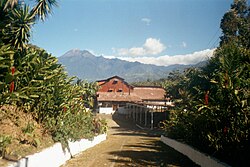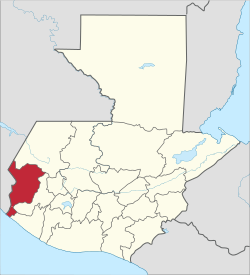San Marcos Department
| San Marcos | |||
|---|---|---|---|
| Department | |||

Finca El Platanillo coffee plantation, with the Tajumulco volcano behind
|
|||
|
|||
 San Marcos |
|||
| Country |
|
||
| Department | San Marcos | ||
| Capital | San Marcos | ||
| Municipalities | 30 | ||
| Government | |||
| • Type | Departmental | ||
| Population (Census 2002) | |||
| • Total | 794,951 | ||
| • Religions | Roman Catholicism, Evangelicalism, Maya | ||
| Time zone | -6 | ||
San Marcos is a department in northwestern Guatemala, on the Pacific Ocean and along the western Guatemala-Mexico border.
The department's capital is the city of San Marcos.
The Spanish conquest of Guatemalan Highlands occurred in the 1520s, followed by the establishment of the Province of Tecusitlán and Lacandón within the Viceroyalty of New Spain. Candacuchex, a settlement of the Mayan Mam people, became the site of the city of San Marcos, established in 1533.
In 1546, once the Guatemalan archdiocese was established, bishop Francisco Marroquín split the ecclesiastical duties in the region among the Order of Preachers, Franciscans and Mercedarians, being the latter appointed to take care of "El Barrio" (in present-day San Marcos and Huehuetenango Departments), which was then a part of the Province of Quetzaltenango]. In 1609 the Captaincy General of Guatemala was established.
In 1690, the Tejutla "curato" had a large area and included the modern municipalities of Comitancillo, Ixchiguán, Concepción Tutuapa, Sipacapa, Sibinal, Tajumulco, Tacaná and part of what is now San Miguel Ixtahuacán. According to the historical writings from Recordación Florida of Francisco Antonio de Fuentes y Guzmán, Tejutla belonged to Quetzaltenango Department and it was a "prosperous land with rich weathers and comfortable forest with enough water".
...
Wikipedia


